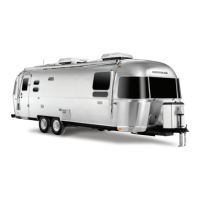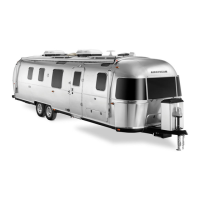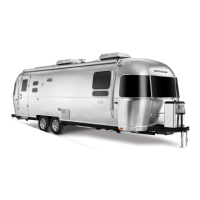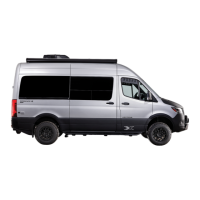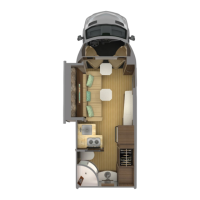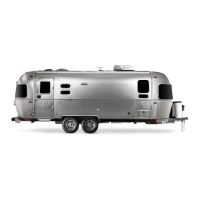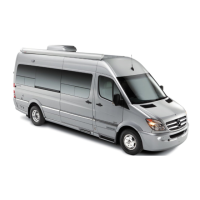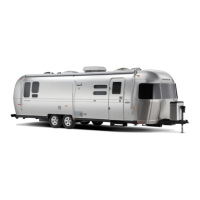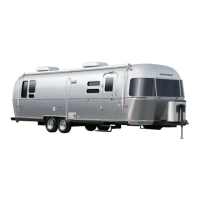Do you have a question about the Airstream Globetrotter 2024 and is the answer not in the manual?
Essential safety recommendations for trailer operation, including passenger transport and weight distribution.
Information on chemical sensitivity, formaldehyde, and proper ventilation practices for trailer health.
Details on smoke alarms, LPG/CO detectors, and their operation and maintenance for safety.
Safety guidelines for operating propane gas appliances and equipment to prevent fire or explosion.
Tips for controlling mold growth by managing moisture and ventilation in the trailer.
Crucial safety precautions for CO detector use, placement, and awareness of CO poisoning symptoms.
Explanation of Carbon Monoxide, its sources, and dangers, particularly in airtight RVs.
Factors that can lead to dangerous Carbon Monoxide levels in the trailer, such as appliance spillage.
Recognizing mild, medium, and extreme symptoms of Carbon Monoxide poisoning for prompt action.
Essential safety rules for using LPG appliances, including ventilation and avoiding comfort heating.
Step-by-step instructions to follow if you detect a gas leak to ensure safety and prevent hazards.
Guidance on checking fire extinguisher charge, operation, and family practice for emergencies.
Ensuring rapid access to exits and contemplating alternative escape routes in case of emergency.
Details on warranty coverage, limitations, exclusions, and the process for obtaining warranty service.
Information on roadside assistance, finding service centers, and reporting safety defects.
Pre-travel checklists, interior/exterior preparation, and essential equipment for camping.
Items and conditions not covered by the Airstream limited warranty, including wear and external damage.
Step-by-step guide on how to request and obtain warranty service for your Airstream trailer.
Conditions under which Airstream's warranty obligations are discharged, such as misuse or neglect.
Exclusions for normal wear and tear on components like upholstery, seals, and finishes.
Responsibility for damage from accidents, delivery, or glass breakage, and insurance coverage.
Exclusion of warranty coverage for issues arising from lack of customer care or improper maintenance.
Chemical gassing is not a defect and is not covered by the limited warranty.
Exclusions for damage from moisture, salt air, pollutants, or sunlight, which are owner responsibilities.
Exclusions for damage resulting from overloading the trailer beyond its capacity or improper loading.
Considerations for extended trailer stays, including condensation and humidity effects.
Understanding mold growth, its causes, and potential risks to the trailer's materials and health.
Factors that promote mold growth, including temperature, moisture, and humidity levels.
Methods to inhibit mold and mildew by controlling relative humidity and ensuring proper ventilation.
Description of the waste water system, including holding tanks and dump valves for proper disposal.
Essential precautions for winter travel, including plumbing protection and maintaining interior temperature.
Layouts for the 25FB, 27FB, and 30RB Globetrotter models, showing interior configurations.
Detailed specifications chart for each model, including dimensions, weights, and capacities.
Information on identifying and interpreting tire and loading, and vehicle manufacturing tags.
Procedure for accurately measuring hitch ball height for proper trailer leveling and towing setup.
Guidelines for using and caring for interior components, including upholstery and general cleaning.
Details on the water system, pumps, draining, and fixtures for maintaining the interior plumbing.
Information on the 12-volt system, batteries, converter, and 120-volt AC panel board.
Setup and pairing instructions for TV, sound systems, Bluetooth devices, and internet connectivity.
Information on operating and maintaining appliances like air conditioners, cooktops, furnaces, and refrigerators.
Care instructions for vinyl upholstery, including stain removal and cleaning techniques.
Recommendations for cleaning and removing interior curtains, advising professional dry cleaning.
Guidelines for cleaning interior aluminum skin, recommending specific cleaners and avoiding abrasives.
Instructions for cleaning and maintaining interior woodwork finishes using appropriate furniture cleaners.
Cleaning recommendations for galley and bathroom countertops, including advice on cleaners and stain removal.
Proper methods for cleaning interior sinks, recommending mild detergents and avoiding abrasive cleaners.
Tips for cleaning luxury woven vinyl flooring, including stain removal and protection from discoloration.
Advice on selecting doormats and rugs made of natural fibers to avoid staining vinyl flooring.
Instructions for cleaning the fiberglass shower stall, including stubborn stain removal and dull area restoration.
Guidance on using the shower head for water conservation and its flexible usage features.
Information on the retractable clothesline installed in the shower stall for convenience.
Steps for setting up dinettes and converting them into beds for various models.
Instructions for filling the fresh water tank, operating the water pump, and purging air from the system.
Details on the water pump switch operation, pressure settings, and pump cycling.
Information on fresh water lines, tanks, and drain/waste systems, including proper disposal procedures.
Operating the RV toilet, conserving water, and ensuring proper slide mechanism function.
Using deodorizers and processing chemicals to manage waste tank odors and dissolve solids.
Proper cleaning methods for faucets, recommending mild solutions and avoiding abrasive cleaners.
Explanation of the 12-volt system, battery location, power distribution, and circuit protection.
Function and operation of the battery disconnect switch for power management and storage.
Details on the 2000W pure sine wave inverter, its features, protection, and remote display.
Description of the power center, converter operation, and safety precautions for electrical distribution.
Overview of 12-volt DC power sources, distribution, and operation of lights, pumps, and appliances.
Explanation of the power converter's function in supplying 12-volt DC power and charging batteries.
Information on the 120 VAC branch circuit breakers, their function, and GFCI breaker operation.
Details on the converter's fan cooling system for longevity and trouble-free operation.
Explanation of the converter's 3-stage switch mode (Absorption, Bulk, Float) for battery charging.
Converter system transformer function, grounding precautions, and proper usage with adapters.
Understanding GFCI breakers, their function, testing procedures, and safety considerations.
Overview of Bluetooth-enabled TVs and Fusion stereo, including pairing and audio output options.
Steps for pairing smartphones and stereos via Bluetooth for music streaming and device connection.
Connecting smartphones and media devices via USB for direct connection and playback.
Connecting Blu-ray/DVD players and streaming devices using BYOD HDMI/Ethernet ports.
Information on the roof-mounted antenna, booster operation, and connecting cable or satellite.
Options for staying connected, including Wi-Fi and Ethernet connections for internet access.
General guidelines for maintaining propane gas appliances and cleaning burner orifices annually.
Details on rooftop AC units, heat pumps, thermostat operation, and voltage requirements.
Instructions for cleaning exterior sponge filters and replacing pleated MERV 8 filters for optimal airflow.
Explanation of the ducted roof system for efficient and balanced air flow throughout the trailer.
Guidance on operating the trailer's gas cooktop, referencing manufacturer's instructions for specifics.
Instructions for operating, cleaning, and servicing the vent fan, including thermostat and rain sensor functions.
How to operate and clean the bath exhaust vent to remove moisture, including safety notices.
Information on operating the furnace, its LP gas and 12-volt power requirements, and safety warnings.
Reference to performance checkout sheets for microwave oven manufacturer, model, and serial number.
Using the monitor panel to check tank levels, battery voltage, and diagnostic functions.
Operating and defrosting all-electric refrigerators, including temperature control and cleaning.
Information on rooftop solar panels, charge controllers, battery health, and pre-wiring for solar.
Instructions for operating the thermostat, changing temperature scales, and understanding button functions.
Details on the continuous water heater, freeze protection, ignition, error codes, and safety warnings.
Guidelines for cleaning the exterior skin, windows, and aluminum wheels to maintain appearance.
Operation and care of exterior components like steps, doors, windows, and protection features.
Connecting external cable TV and internet services via the SmartPlug inlet.
Information on axle alignment, bearings, and maintenance for the running gear assembly.
Details on LPG tanks, fill valves, regulators, and safety rules for gas systems.
Recommendations for washing and waxing the exterior aluminum skin, including cleaning solvents.
Instructions for cleaning exterior windows and seals, including tips for releasing stuck windows.
Guidelines for cleaning aluminum wheels, recommending mild soaps and avoiding abrasive cleaners.
Instructions for operating the trailer's step, ensuring it is secure before use and stowed for travel.
Details on the main door lock, dead bolt, hold-back, and troubleshooting for inoperable handles.
Information on operating the screen door and securing it to the main door before closing.
Instructions for opening emergency escape windows, including screen removal and latch operation.
Information on window stone guards and stainless steel rock guards for protecting the front end.
Operating instructions for the power awning, including sun protection, rain/wind retraction, and LED lights.
Location and procedure for filling the fresh water tank using the gravity water fill port.
Connecting to a city water supply, including pressure regulation and hose requirements.
Information on the exterior shower, its components, and water supply options.
Connecting to shoreline power, including SmartPlug inlet features and cordset safety indicators.
Features of the SmartPlug inlet, designed for increased conductivity and ease of use.
Checking SmartPlug cordset LED indicators for safe power connection and understanding reverse polarity.
Connecting external cable TV and internet services via the SmartPlug inlet.
Location and operation of the exterior 120-volt receptacle, requiring shoreline power.
Operation of the EZ-Latch coupler, proper attachment, and safety chain requirements.
Operating the power jack, manual operation, and safety warnings related to its use.
Details on LPG tanks, fill valves, regulators, and safety rules for gas systems.
Proper installation, removal, and safety precautions for LPG tanks, including regulator mounting.
Connecting appliances to the exterior LPG port using a quick-connect coupler and supply line.
Essential safety rules for using LPG appliances, including ventilation and avoiding comfort heating.
Selecting a tow vehicle with appropriate options like heavy-duty alternators, radiators, and transmissions.
Information on Dexter Nev-R-Adjust brakes, electronic brake controllers, and proper brake use.
Critical aspects of loading, weight distribution, and balancing for safe trailer towing.
Proper hitch load distribution, connecting the trailer to the tow vehicle, and safety chain use.
General towing advice, including practice, tracking observation, and safe driving practices.
Function and operation of the breakaway switch for trailer brake activation in case of separation.
Methods for weighing the trailer, determining axle weights, and calculating tongue weight.
Wiring and function of the 7-way plug for trailer lighting, brakes, and 12-volt power.
Achieving proper hitch load distribution for safe towing, including weight transfer to tow vehicle axles.
Using the wireless observation system for rear visibility while towing and backing up.
Managing temporary cooling system overload during severe towing conditions and actions to take.
Techniques for downhill driving, slippery conditions, and avoiding tow vehicle skid with trailer brakes.
Tips for driving in mud and sand, using appropriate gears, and handling stuck situations.
Adjusting for sway induced by passing vehicles and using trailer brakes to maintain stability.
Guidelines for safe passing on highways, maintaining space, and accounting for trailer length.
Step-by-step instructions for slowly backing up the trailer, correcting direction, and practicing maneuvers.
Safety precautions when stopped on a hill, including chocking wheels and not relying solely on trailer brakes.
Understanding sway causes, factors impacting control (equipment, weight, driving), and corrective measures.
Techniques for reducing sway, including slowing down, gentle brake application, and steering adjustments.
Recommendations for using sway control devices to improve towing comfort and safety.
Regular maintenance schedule based on mileage or time intervals for various trailer components.
List of recommended maintenance parts, including lighting, fuses, breakers, and interior touch-up supplies.
Comprehensive guide on tire care, including changing, inflation, load limits, inspection, and replacement.
Information on rubber torsion axle alignment specifications and Nev-R-Lube bearing inspection.
Instructions for power jack maintenance, including lubrication and bubble level adjustments.
Guidance on battery capacity, maintenance, storage, and types (Lead Acid, AGM, Lithium).
Access locations and strainer cleaning procedures for the water pump system.
Procedures for draining fresh water tanks, sanitizing the system, and opening/closing drain valves.
Procedures for draining and flushing black and gray water tanks, including drain system cleaning.
Steps for winterizing the trailer's systems and preparing it for storage to prevent freeze damage.
Lubrication and adjustment procedures for the main door to ensure smooth operation and proper sealing.
Tips for dealing with sticking windows and cleaning the glass and gasket.
Schematics for 12-volt and 120-volt systems, including wiring diagrams for various models.
Diagrams illustrating the plumbing layout for fresh water systems in different models.
Answers to frequently asked questions regarding electrical, plumbing, and appliance operation.
Steps for safely changing a trailer tire, including jack location and wheel lug nut torquing.
Identifying the correct jack location on the trailer frame for safe tire changes.
Importance of proper tire inflation, checking pressure, and understanding load capacity for safety.
Consequences of underinflated tires, including damage, reduced durability, and potential failure.
How overloading affects tire performance, suspension, and can lead to tire failure.
Importance of weighing trailers and towed vehicles to ensure tires are not overloaded.
Essential tire care functions like traction, steering, stopping, and proper maintenance for tire life.
Recommendations for checking tire pressure, avoiding overload, inspecting for damage, and proper speed limits.
Inspecting tires before trips or storage, checking for wear, damage, and condition of hardware.
Considerations for replacing tires with different sizes, including load capacity and fitment checks.
Understanding tire ratings, load capacity, and pressure compatibility when selecting new tires.
Differentiating between single and dual tire load ratings and understanding axle terminology.
Importance of proper lug nut torquing for wheel security, sequence, and checking frequency.
Location and removal procedure for the spare tire carrier, including warnings for damaged tires.
Recommended intervals for tire rotation to ensure even wear and maximize tire life.
Procedures for inspecting Nev-R-Lube bearings, checking end-play, and identifying issues.
Operating the power jack, housing cover removal, gear inspection, and lubrication requirements.
Information on battery capacity measurement (AH) and factors affecting battery runtime and discharge.
Procedures for cleaning, maintaining, and storing lead-acid, AGM, and lithium batteries.
Considerations for lithium battery charging and operation in cold weather, including internal heating systems.
Using the SmartShunt with the VictronConnect app for monitoring battery parameters via Bluetooth.
Identifying the locations for accessing the water pump and strainer for maintenance.
Procedure for cleaning the water pump strainer, including bowl removal and reinstallation.
Locating internal and external fresh water tank drain valves and understanding their operation.
Steps for draining the fresh water tank using the pump or drain valve, and preventing pump damage.
Procedures for sanitizing the potable water system using bleach or other approved solutions.
Proper procedures for dumping the black water tank, including flushing and managing accumulated solids.
Using the water hose connector to flush the black water tank and maintain spray head function.
Recommended cleaning agents for waste water systems, avoiding petroleum distillates and abrasives.
Step-by-step guide to winterizing the trailer's water system, tanks, and fixtures to prevent freeze damage.
Steps to restore the trailer's water system to service after winter storage, including flushing antifreeze.
| Category | Motorhomes |
|---|---|
| Year | 2024 |
| Manufacturer | Airstream |
| Model | Globetrotter |
| Exterior Width | 8 ft 5.5 in |
| Interior Width | 8 ft 1 in |
| Exterior Height with A/C | 9 ft 9 in |
| Interior Height with A/C | 6 ft 7.5 in |
| NCC | 1, 500 lbs |
| Gray Water Tank | 37 gal |
| Black Water Tank | 39 gal |
| Sleeps | 4 |
| Sleeping Capacity | 4 |
| A/C BTU | 15, 000 |
| LP Gas Capacity | 60 lbs |
| Interior Color Options | London Grey |
